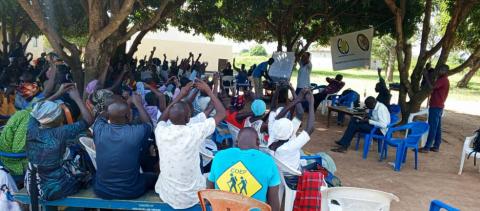PDM BENEFICIARIES IN OCOKICAN TRAINED ON MINDSET CHANGE
The Parish Development Model (PDM) is a transformative initiative by the Ugandan government aimed at lifting impoverished households to middle-income status. However, mindset change has been identified as a critical factor in ensuring its success.
In Soroti District, efforts have intensified to train PDM beneficiaries on adopting positive business mindsets. Last week, 250 beneficiaries from Ocokican Sub-County participated in a mindset change training session facilitated by Enterprise Uganda.
According to France Egudu, the Community Development Officer (CDO) for Ocokican Sub-County, the training aligns with pillar five of the PDM, which emphasizes the importance of mindset change in driving productive enterprises.
“The Parish Development Model is designed to help impoverished households move to middle-income status, but mindset change is crucial for its success,” Egudu explained.
Florence Adupo, a trainer from Enterprise Uganda, highlighted that many PDM beneficiaries are small-scale farmers whose primary challenge is learning how to maximize limited resources to enhance productivity.
“This training is about equipping them with the skills and knowledge to see beyond subsistence farming and embrace opportunities for growth,” Adupo stated.
While officiating the closing the training, Soroti Resident District Commissioner (RDC) Paul Eseru underscored the significance of mindset change in reducing poverty. He noted that government interventions under PDM must prioritize equipping beneficiaries with the tools necessary to effectively utilize the program.
“We need to promote the mindset change agenda among our people. This is key to reinforcing strategies aimed at reducing poverty in our communities,” Eseru remarked.
The training in Ocokican is part of a broader effort to prepare beneficiaries to leverage PDM for sustainable development. By fostering a positive business mindset and equipping communities with essential skills, the government hopes to ensure the program achieves its objectives of poverty reduction and socio-economic transformation.
The primary goal of PDM is to transition households from subsistence farming to the money economy, ensuring increased food security, higher incomes, and better quality of life. It envisions a total societal transformation, targeting both rural and urban settings.
With the ambition of moving 39% of households into the money economy within five years, PDM integrates agricultural extension services, infrastructure development, and social service delivery to accelerate socio-economic transformation.
By Abraham Ekwaru, the District Communication Officer, Soroti


